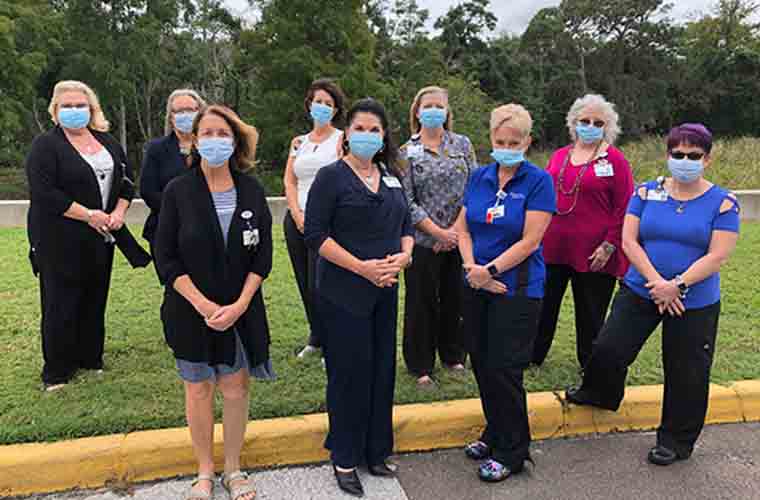BayCare’s Certified Diabetes Educators Adjusting Services due to COVID-19

When COVID-19 rocked the nation in March, the Morton Plant Mease Certified Diabetes Educators felt a sense of urgency. After all, their patients were deemed in a high-risk group. Now more than ever, they needed to be able to communicate with them. But how?
For the safety of patients, team members and the community, in-person classes were halted at BayCare facilities. The team needed to adjust – and fast.
“Everyone of us recognized this would be a critical factor and we couldn’t just drop the service,’’ said Gina Nelson, site manager of the Morton Plant Mease Diabetes Education Center. “The first week or two, we loaned staffers to the phone bank to help answer COVID-19 questions. While they were out, we put together a telephonic plan.’’
The team devised priorities for what it would discuss and tailored its services to the phone. The service wasn’t billable, so it was free of charge.
The response was exceptional, Gina said. “We’ve received some of the best surveys we’ve ever seen.’’
On Sept. 1, the Certified Diabetes Educators transitioned their service from telephonic to telehealth, with billing approved, allowing the educator and patient to see each other face-to-face. Family members can be linked in, too, if they wish, as long as they’re in the state of Florida.
From the educators’ perspective, there is less travel involved, and they can focus on individualized care rather than a more generic approach called for in a classroom setting.
From the patient’s perspective, surveys show, it’s a more favorable experience, too.
“We have a captured audience,’’ Gina said. “The patients are in the comfort of their home, in their easy chair. They choose the day and time. It’s very patient centered.’’
The numbers tell the story. In September 2019, Morton Plant Mease educators saw 69 patients in classes. In September this year, they saw 167 through telehealth.
Instruction includes:
- Diabetes self-management and follow-up
- Gestational diabetes antepartum counseling
- Medical nutrition therapy for diabetes and prediabetes
- Injectable education training
- Insulin pump preassessment and support
- Glucose monitor training
All topics lend themselves to telehealth, Gina said. “Telehealth has no barriers. Nurses can demonstrate to patients how to do insulin shots or monitor glucose.The whole program runs smoothly and we're getting great feedback all aorund.’’
The Morton Plant Mease Diabetes Education Center is just one of several within the BayCare Health System. Each has found a way to adjust during the pandemic.
Since June, diabetes management programs at South Florida Baptist Hospital, St. Joseph’s Hospital, St. Joseph’s Hospital-North, St. Joseph’s Hospital-South, Winter Haven Hospital and Bartow Regional Medical Center have been offering all of their services on a one-on-one basis. The centers follow BayCare’s guidelines for infection control: disinfecting areas, doing temperature checks, practicing social distancing and wearing masks.
“This has allowed us to not only provide the patient with information they need to manage glucose and take care of their health, but also to address their individual needs and concerns,’’ said Janet Jeffrey, East and Polk Region Director of Hospital Diabetes Services. “Patients have been very receptive and have said they feel safe when coming to meet with us.’’
At St. Anthony’s Hospital, the approach has been much the same. The St. Anthony’s LifeHelp Diabetes & Nutrition Center’s outpatient team worked closely with the hospital’s Infection Control team to implement CDC/Florida guidelines, which allowed for early adoption of safe practices. The center has continued in-person, one-on-one services throughout the pandemic by using a larger conference room and larger education spaces to allow for social distancing.
“The majority of our patients prefer in-person education, but the team also provides individual consults through the BayCare Anywhere virtual platform,’’ said Dianna Thomas, certified diabetes education coordinator at LifeHelp. “Each month we’ve received increased referrals for diabetes self-management education and medical nutrition therapy.’’
At Winter Haven Hospital, the yearlong Diabetes Education Program had just gotten underway in March when COVID-19 struck. The class of five, led by Certified Diabetes Educator Tara Fleeman, decided to continue by meeting on Skype.
“When you’re at home all the time, it’s difficult to keep yourself from going to the fridge or the cabinet all the time,” Tara said. “I think it was really helpful to have that time together during the pandemic so that we could encourage each other.”
The class is on track to graduate in December, and Tara is planning a ceremony in which social distancing and other safety measures can be observed.
For the Morton Plant Mease team, the continuation of telehealth has been approved into 2021. In fact, there is conversation about whether this is a better model.
“We’re getting patients far outside our usual norms, referrals outside the BayCare family of hospitals and region,’’ Gina said. “It’s a real change in how we think and provide our services. We’re excited to expand our reach and help more patients than ever.’’
For more information about the Morton Plant Mease Diabetes Education Center, call (727) 734-6888. For more information on BayCare diabetes services, go to BayCareDiabetes.org.